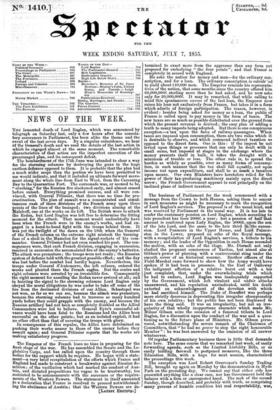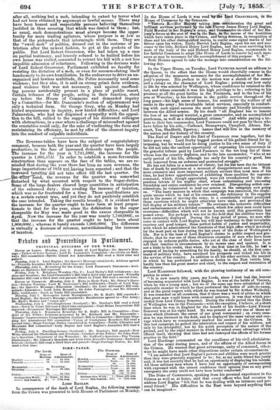The business of Parliament for the week commenced with a
message from the Crown to both Houses, asking them to concur in such measures as might be necessary to mark the recognition of Lord Raglan's services. The proposal is of the usual kind, and was received by Parliament in the usual way. It is too late to confer the customary pension on Lord Raglan, which according to late precedent has been 2000/. a year; but a pension of half that amount is conferred upon Lady Raglan, the 20001. upon the son of the late Lord, and the same to the heir third hi the succes- sion. Lord Panmuro in the Upper House, and Lord Palmer- ston in the Lower, proposed an echo of the Royal message, with a recapitulation of Lord Raglan's services, a tribute to his memory ; and the leader of the Opposition in each House seconded the motion, with an echo of the eloge. Mr. Disraeli not only studied the pregnant conciseness of Tacitus, but aimed also at Gibbon's power of piercing with a controversial sting under the smooth cover of an historical resume. Brother officers of the Field-Marshal came forward to show how the Army would have spoken if it had been in presence. In the Earl of Galloway the indignant affection of a relative burst out with a too just complaint, that, under the overwhelming trials which he had to endure, Lord Raglan was inadequately supported by the Government, which left virulent and unfair attacks unanswered, and his reputation unvindicated, until his death extorted an acknowledgment of the devotion with which he had sacrificed himself. The Duke of Beaufort was perhaps more strictly decorous in deprecating this irregular championship of his own relative ; but the public has not been displeased to have the thing said. It was an irregularity, but not an irre- gularity of that wholly inopportune character which made Mr. Milner Gibson seize the occasion of a funereal tribute to Lord Raglan, for a discussion upon the conduct of the war and a ques- tioning as to the future plans of Ministers. Mr. Gibson perse- vered, notwithstanding the severe remark of the Chairman of Committees, that "he had no power to stop the right honourable Member " : he was best answered by the omission of all answer whatsoever.
Of regular Parliamentary business there is little that demands note here. The same course that we remarked last week, of easily forwarding agenda, such as the Limited Liability Bills, or as easily bidding farewell to postponed measures, like the three Education Bills, with a hope for next session, characterized the proceedings this week.
The exception was Lord Robert Grosvenor's Sunday Trading Bill, brought up again on Monday by the demonstration in Hyde Park on the preceding day. We cannot say that either side has presented anything like a clear case, nor has Government held the balance with a firm or ansuspeoted hand. The mob of the second Sunday, though described, and probably with truth, as comprising many persons of humble condition but real respectability, was, after all, nothing but a mob, intending to extort by terror what had not been obtained by argument or lawful means. -There may have been honest and respectable persons believing 'themselves- justified in thus securing that whioh was denied to them ; but, as usual, such demonstrations must always become the oppor- tunity for mere trading agitators 'whose purpose is as low as that of the pickpockets that intermingle with them. They are the "swell mob" of politics, dressed out in the costume of pa- triotism after the newest fashion, to get at the pockets of the public. But Lord Robert Grosvenor, who had taken up a case on partial testimony, and breadrefused to be bullied before his own house was visited, consented to retract his bill with a not less impolitic admission of reluctance. Following in the devious wake of Lord Robert Grosvenor, Parliament exhibited no faculty for resisting the dictation of a mob, or even for accommodating itself handsomely to its own humiliation. In the endeavour to drive an un- organized and lawless multitude, the Police necessarily used some 'violence; but they also, it is said on strong prim& facie evidence, used violence that was not necessary, and against unoffend- ing persons accidentally present in a place of public resort. Certain tribunes of the people, acting in their function, stood up before the House of Commons and demanded inquiry by a Committee—for Mr. Buncombe's motion of adjournment was only a technical form. Sir George Grey, who on Monday had hinted acquiescence in inquiry, now hinted difficulties ; and Lord Palmerston, who had not disguised a sympathy with the opposi- tion to the bill, rallied to the support of his distressed colleague with obstructions in a case where a challenge of misconduct against the constables could only, for the sake of vindicating the force and maintaining its efficiency, be met by offer of the clearest inquiry into the conduct of culpable individuals.



























